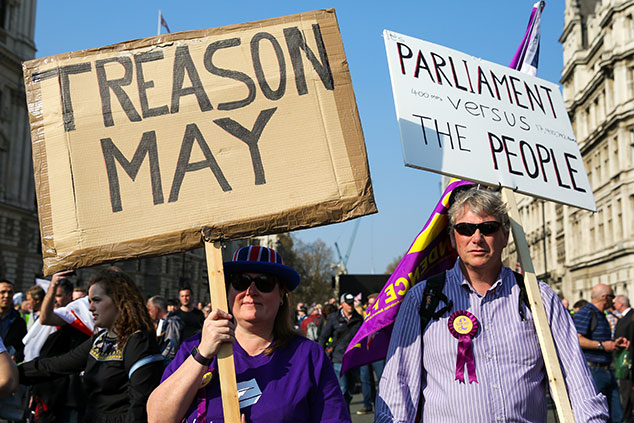
I’m not. Disappointment can only be a function of expectation. With that in mind it is worth returning to what we all actually expected before the UK’s now nearly three-year national Brexit bicker kicked off.
Looking back at my own writing from just before and just after the 2016 referendum, I can see what I expected. “Vote Leave, get Remain,” I said in one piece a few weeks before. And, just after, I said that while I hoped for something like Norway’s status, I didn’t expect the UK to leave in any meaningful sense. I thought we would either not leave at all after a second referendum based on a mini-concession from the EU (the EU has form here) or we would leave in such a feeble fudged way that no one would notice. As then-French president François Hollande pointed out to David Cameron in 2012, you don’t get to take authority back from Brussels. Europe “is for life”, he said.
Initially, it looked like Hollande would be proven right. The calls for a second referendum came immediately, as did the supposedly calming suggestions that the UK wait to trigger Article 50 until some far away and definitely unspecified future date. A Brexit version of extend and pretend, if you will. The House of Commons was jammed with Remainers desperately trying to think of ways not to deliver what they had promised. Then, in another sign that a stitch-up might be under way, we got a Remainer prime minister.
Why Theresa May was right
But something changed. Theresa May decided that we must have what we voted for and invoked Article 50. It is now standard for critics to say that May should have waited to do that, until we knew what kind of Brexit we all wanted. That is not fair. May has made some very real mistakes – consenting to agree the withdrawal agreement before the future arrangement (effectively paying without knowing what for); ruling out a no-deal departure; and of course having the wrong personality for the job of persuading 650 independent-minded people to even think about agreeing on anything.
On Article 50, May was right. Had she not invoked it when she did, given the Remain sympathy built into our system, the opportunity to do so could have been lost for ever.
As for her deal, if you look back to 2016 you see very few people arguing for what they support now. Before the referendum, Remainers were promising to respect the referendum result. Leavers were voting for the chance of hanging on to the UK’s democracy (currently proving itself pleasingly flexible and effective) and bringing some sovereignty home. But most of them were just beginning to figure out how the EU really works. If someone had handed them May’s deal in the week after the vote, I suspect they would have all signed up on the spot. It does the basic job of taking us out – no matter how entwined we end up being with the EU, we are clearly outside its ongoing integration project; no transnational tax harmonisation for us.
But losing the referendum seems to have driven a small but influential group of Remain voters to the edge of madness; winning has done the same for some Leavers. When the history books cover Brexit in a couple of paragraphs jammed between financial crises, they will look for someone to blame for us not leaving this week. They should point at former prime minister Tony Blair and others who insisted that UK voters must be asked repeatedly what they wanted until they gave the preferred answer, and the small group of dogmatic Conservative MPs who won’t vote for May’s deal because it isn’t exactly what they hoped for.
Brexit madness is not unique to Britain. Remember Donald Tusk, president of the European Council, saying that Brexit could be “the beginning of the destruction of not only the EU but also of Western civilisation”? Nuts. But the syndrome has had a nasty effect on the UK’s ability to figure out how to leave.
Leavers will get what most of them wanted
On the plus side, all the signs now are that ordinary Leavers will get what they wanted: out. I would have liked May’s deal to have gone through smoothly, but it was good to see in the indicative votes this week that there is still no majority among our MPs for backsliding on the basics.
The stunningly cynical idea of revoking Article 50 in the face of no deal pushed by the Scottish National Party (imagine their reaction if someone had done the same with an independence vote in Scotland!) got a mere 184 votes. The idea of another referendum received 268 votes, but lost by 25 votes.
Our MPs are coming in for a lot of criticism right now. They shouldn’t be. They have had to grapple with a huge amount of unfamiliar material and power, but they are still clearly heading towards getting the UK out of the EU in some way – most likely in a single market and customs union deal followed by more talks.
For Leavers who remember 2016, the exact endgame isn’t the point. Despite the Remainer dream that a long extension will morph into a second referendum, all the signs are still that we will be leaving the EU. And, referendum or no referendum, in 2016 that was far from a given. Disappointed? Not yet.
• This article was first published in the Financial Times